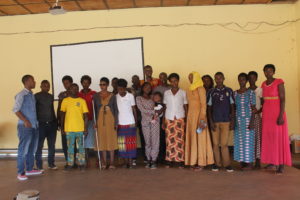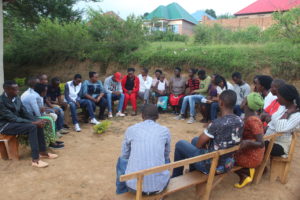

Not many charities say their aim is to close down. But Network for Africa’s vision is making a world where we are no longer needed. That is why we focus on training local people to run our projects. We don’t use our resources to send a non-African to do the job that an African could do. If our efforts are to have a lasting impact, then they must depend on local people to keep them going.
An example of this “it’s not rocket science” approach is our group counselling project in Rwanda. The need is enormous: thousands of youthful survivors of the 1994 genocide are only now confronting the horror of seeing their families murdered. They struggle to make ends meet, alone and vulnerable, prone to depression and hopelessness. In our survey, we found that half of them had tried to take their own lives.
Training the Trainers
Rwanda is a poor country, lacking the resources to give counselling to all who need it. Our Rwandan partner, the Survivors’ Fund, suggested we train their counsellors who will in turn train local people to become counsellors. (This is called “training the trainers”). What’s more, the local people trained by the Survivors’ Fund are themselves survivors who have endured trauma, so they are familiar with the challenges faced by people with depression and other mental health issues.
In January, the project enrolled 272 participants, in 12 groups spread across Rwanda. The group members then selected two from their ranks to become Peer Support Counsellors for their group. Once their training was complete, they began convening the groups every two weeks. During these sessions they raise awareness about trauma, anxiety, insomnia and depression. Their aim is to reduce the stigma attaching to mental health issues: understanding the source of emotional distress can be a first step on the road to building resilience.
Each session lasts about two hours, and enables people to share their problems, finding a degree of immediately relief by realising they are no longer alone. Everyone there knows what they say is confidential, and the group is based on trust. They are taught techniques helping them focus on the positive aspects of their life, to take pride in their achievements, build self-confidence and to change their future prospects. When counsellors identify survivors who need individual help, they do home visits – the team has made 260 home visits this year. When a participant has problems beyond the counsellors’ capability, they are referred to the Survivors’ Fund’s professional counsellors (whom we trained) who have provided 615 private counselling sessions this year.
We are also working hand-in-hand with the Rwandan health care system, giving three-day training courses to 29 local health workers where our 12 groups meet. The training has covered therapeutic communication, post-traumatic stress disorder, depression and psychosomatic disorders. In this way, we are strengthening Rwanda’s mental health services – a benefit that will endure long after our project ceases.
Our Impact
Several of the groups have formed communal savings schemes, and are growing crops together. The participants tell us they no longer feel isolated, and they are supported by their fellow group members. A new form of family has filled the gap left by their relatives who were murdered in the genocide.
News of our project has spread, and we already have a waiting list of 70. We are grateful to the individuals and foundations who make this work possible.